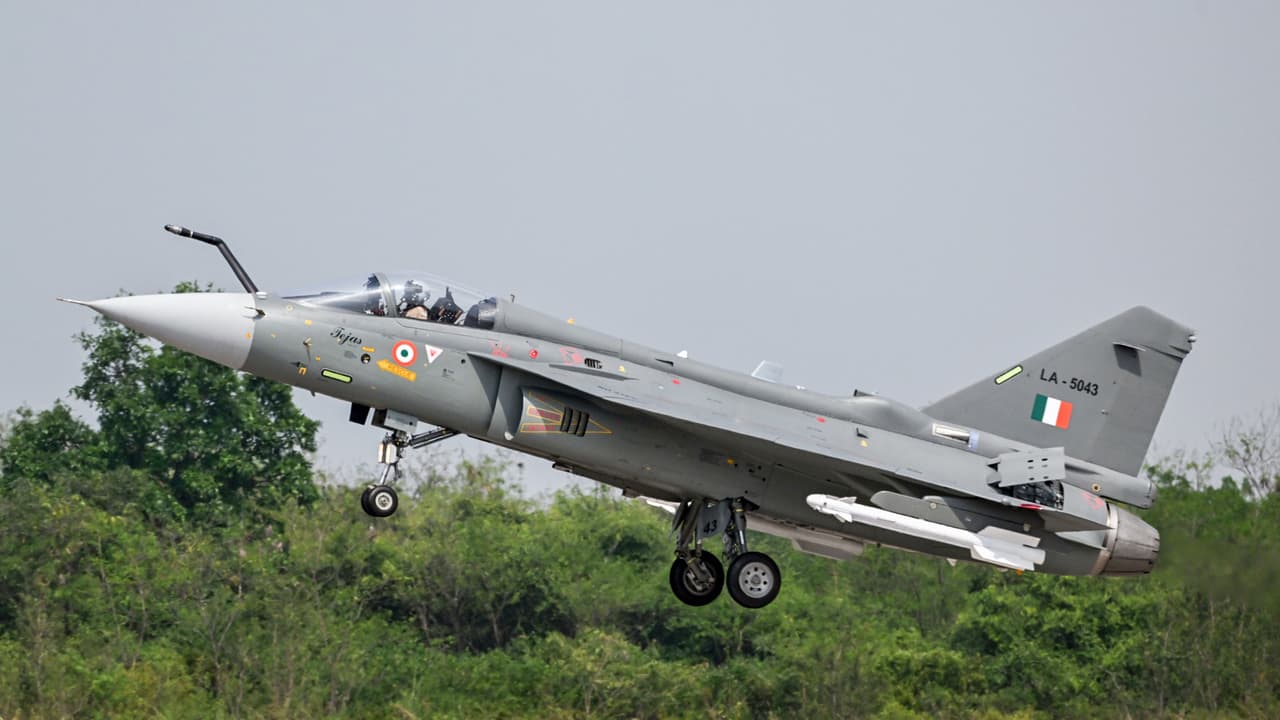The IAF doubts HAL will deliver the Tejas LCA Mk1A by March 2026, citing delays despite engines being ready. Certification and testing hurdles raise fears amid India’s shrinking fighter strength.
New Delhi: The Indian Air Force remains unsure whether Hindustan Aeronautics Limited (HAL) will deliver the Tejas LCA Mk1A on time, even after the deadline was pushed to March 2026. HAL CMD DK Sunil announced the new timeline during the fighter’s debut flight on October 17 in Nashik, attended by Defence Minister Rajnath Singh. Earlier, in September, Sunil had assured that the first two of the 83 ordered aircraft would be delivered to the IAF by October this year.
IAF Doubts HAL’s New March 2026 Deadline
However, sources in the Indian Air Force told Asianet Newsable English: “The HAL made us believe that the delay in delivery of the aircraft is happening due to the engine supply issue from the United States. But the fact is something different. The HAL has received four engines so far, with the first one received in April.”
“HAL had said that we are waiting for the engines. Engines are here but where is the first fighter jet?” one of the sources asked.
Timeline Pushed Back Repeatedly
According to the contract, deliveries were originally slated to begin in February 2024. However, repeated delays caused by GE F404 engine supply issues, software integration, and testing have continuously pushed the timeline back.
“We have ‘little confidence’ in the schedule as it would take atleast 6 months to complete all the process,” sources added. “The HAL has made a fresh commitment on the delivery status but we are not sure that we would be able to get the aircraft and inducted before mid-2026.”
Weapon Trials and Certification Delays Loom
Another source revealed that trials of the integrated weapon systems are currently in progress and will take additional time to conclude.
After the trials, the Centre for Military Airworthiness and Certification (CEMILAC) must issue airworthiness approval — a process expected to take at least six months. Any observations or issues raised during certification could further delay the schedule.
CEMILAC is responsible for certifying all Indian airborne platforms, including aircraft, helicopters, UAVs, parachutes, and aerostats.
Every Line Replaceable Unit (LRU), system, component, material, and software used in military platforms must undergo CEMILAC certification to ensure compliance with the Armed Forces’ standards for performance, reliability, and lifespan.
IAF’s Fighter Strength Hits a New Low
With the retirement of MiG-21 fighters, the squadron strength of the Indian Air Force has dwindled to 29 against the sanctioned strength of 42.
“Dwindling strength of the fighter squadrons is a matter of concern for the force at a time when we have active adversaries on both front – northern as well as western.”
The LCA Mk1A, an upgraded version of the Tejas Mk1, features advanced radar, enhanced electronic warfare capabilities, and improved maintainability.
As a crucial element of the IAF’s modernization program, 83 Mk1A jets were ordered under a ₹48,000 crore contract signed in 2021. In September, the Defence Ministry further approved the purchase of 97 additional Mk1A fighters for over ₹62,370 crore.
“The delivery of these aircraft would commence during 2027-28 and be completed over a period of six years,” a defence official had said then.
IAF Chief’s Public Frustration Over Delays
It is worth noting that IAF Chief Air Chief Marshal A.P. Singh has, on several occasions, publicly voiced his dissatisfaction with the repeated delays in the delivery of the LCA Mk1A by HAL.
In May, during an event, he had said: “So, once a timeline is given, not a single project that I can think of has been completed on time. So this is something we must look at. Why should we promise something which cannot be achieved? While signing the contract itself, sometimes we are sure that it is not going to come up, but we just sign the contract.”
Despite the ongoing challenges, HAL maintains that its Bengaluru production lines are now running at full capacity. The company has successfully completed ground and flight tests for multiple Mk1A prototypes and is expanding its supplier network to meet the IAF’s growing requirements.
